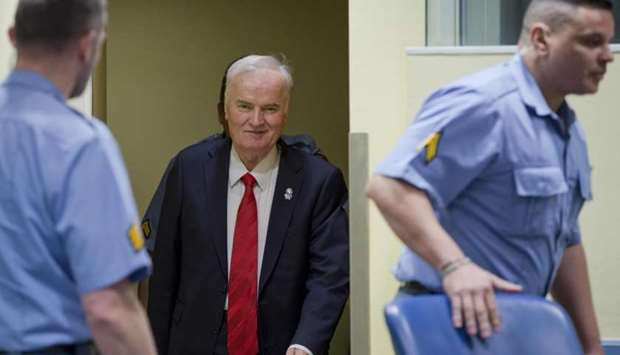UN judges Wednesday began handing down their verdict in the trial of former Bosnian Serbian commander Ratko Mladic, accused of genocide and war crimes in the brutal Balkans conflicts over two decades ago.
Dubbed "The Butcher of Bosnia," Mladic's trial is the last before the International Criminal Tribunal for the former Yugoslavia (ICTY) and comes as the court prepares to close its doors next month.
After rumours that he would not attend his verdict, the former general, 74, who once cut a swathe of fear against Bosnia, appeared relaxed in courtroom as he listened intently to presiding judge Alphons Orie.
Wednesday's verdict has been long awaited by tens of thousands of victims across the bitterly-divided region, and dozens gathered early outside the courtroom in The Hague, many clutching photos of loved ones who died or are among the 7,000 still missing.
"Bosnia and Herzegovina: No impunity for war criminals!", read one banner, while another had a picture of Mladic with a human skull saying: "Guilty of all!"
"We will see today. Will he be found guilty or will he be seen as a hero?," Munira Subasic, president of the Mothers of Srebrenica, told AFP.
Mladic has denied 11 counts including genocide, war crimes and crimes against humanity allegedly committed during the 1992-1995 war that killed 100,000 and displaced 2.2 million as ethnic rivalries tore Yugoslavia apart.
Prosecutors accuse Mladic and his political counterpart Radovan Karadzic of seeking through ethnic cleansing to "permanently remove" Bosnian Muslims and Bosnian Croats from areas claimed by Bosnian Serbs.
- Genocide -
Wednesday's verdict "is one of the most important in the history of the tribunal", chief prosecutor Serge Brammertz told AFP.
Mladic "was the mastermind behind the killing of thousands of people," he said. In a twist of fate, former Serbian president Slobodan Milosevic died in 2006 while on trial.
Caught after 16 years on the run, Mladic faces two genocide charges including for the 1995 massacre in northeastern Srebrenica, where troops under his command slaughtered almost 8,000 Muslim men and boys.
The killings, in which the victims were marched away, shot in the back and dumped in mass graves, was one of the darkest episodes in the conflict, and has been called the worst atrocity on European soil since World War II.
Once a brutish military commander who strode around in combat fatigues, Mladic will also be judged for directing a 44-month campaign of sniping and shelling to terrorise citizens in Bosnia's capital Sarajevo, which left about 10,000 dead.
Mladic is further charged with taking hostage more than 200 NATO military personnel and keeping them as human shields to prevent NATO air strikes against the Bosnian Serb army.
Prosecutors have called for a life sentence, and Brammertz said that given Mladic's alleged "high level of responsibility" no other term "will be acceptable to us".
In a complex case spread over five years, almost 600 witnesses testified and more than 10,000 exhibits were presented.
'Not a monster'
But defence lawyers -- who in the past few days filed a flurry of requests to have their ailing client's health assessed -- have slammed his trial as "political".
Just minutes before the verdict hearing began, they filed a new motion protesting that it was going ahead and saying he was appearing "against the advice of medical specialists."
In a background paper handed out Wednesday to reporters, they insisted: "The prosecution has failed to uncover a single order in which General Mladic ordered anyone to commit a crime."
They insist he is "not a monster" and have called for his acquittal.
After suffering at least three strokes, Mladic has been left with "part paralysis of the entire right side of his body," lawyer Dragan Ivetic said.
- 'We need justice' -
For victims of the atrocities committed by the Bosnian Serb army however, the time has come for Mladic to face justice.
Subasic, who said she had begged Mladic to spare her son at Srebrenica, told AFP the truth had to be unveiled.
"We need truth, we need justice. Without justice there's no trust, without trust there's no reconciliation," she said.
For Fikret Alic,a survivor of a Bosnian Serb camp, told AFP: who was in "I hope justice will be done by this verdict, so that people will stop suffering. It will send a message to the world."

